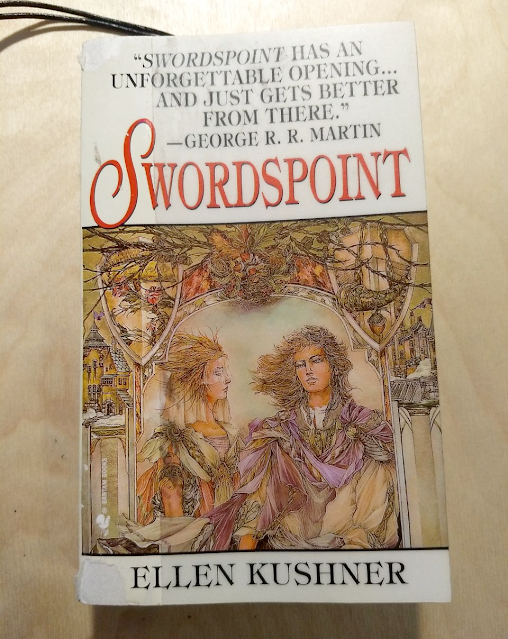Reading: Swordspoint
My choice to read Swordspoint by Ellen Kushner started with my desire to re-read The Fall of the Kings, a book that I happened to pick up randomly at a book outlet when I was maybe 12 or 13. At this same outlet I'd also picked up Katie Waitman's The Merro Tree as well as The Essential Bordertown: A Traveler's Guide to the Edge of Faerie- a collection of short stories about the human world and the elfin world connecting. At this age I was totally rabid for anything SF/F and often brought home huge hauls of books from library book sales, where you could fill a bag for a couple dollars on the final days of the sale. It should probably surprise no one that a lot of my experiences with these books were formative and were some of my earliest experiences with queerness. Generally I was reading books that were only aimed at adults for the most part since I didn't really *do* YA except when I was quite little- barring some obvious furry bait choices like Redwall. The Fall of the Kings was one of those very formative books that presented young me with a very luscious and ribald bisexual world, penned by authors who- less known to me at the time, were each others wives.
I'd never read Swordspoint and wanted to dive into the world that Kushner had established before writing The Fall of the Kings with Delia Sherman. The world this book is set in was first a couple short stories, then became Swordspoint and then was revisited at a later time with The Fall of the Kings.
My slightly beat up former library copy of Swordspoint, with a pretty cover by Thomas Canty. This copy also includes the short stories Kushner had written previous to this novel.
Swordspoint isn't really the kind of book I would typically read, mostly in that I've tended to enjoy more outlandish or fantastical or perverted stories (which is not a slight on the book, mind, it's just where my tastes have landed over the decades). I enjoyed it though. It plays out very much like a historical drama though its setting is fictional and not based on any real place or time period, rather inspired by a broad amalgam of times and places. In this world and this particular city, the ruling class consists of noble families who hold different seats of power. They settle many personal disputes through the hire of professional swordsmen who act as their proxies in battles of honor. The main character in Swordspoint is a swordsman and one of the very best. Richard St Vier has a reputation and is highly sought after and this fact results in him being embroiled in an unfolding political intrigue. This ends up putting St Vier into a very precarious situation along with his mysterious lover Alec, a disgraced scholar of hinted noble origins.
I feel in some ways that this plot of political intrigue, the specific details of which I won't get into, plays out very much like a BBC period drama. There's adultery, vying for power, blackmail, kidnapping, spurned lovers, and jealous nobles in their own separate little microcosm from the peasant folk. Though the machinations of the upper class very much involve and affect the lower class. There's also a bit of a courtroom procedural element much later in the book.
It's very much a story about class, with St Vier, despite his prestige, living in a poor and dangerous area while acting as this noble pawn for high society. His view of life is a nihilistic one in some ways- death as an inevitability of his trade and as part of his code of honor, the only thing worth pursuing being the craft itself. There is no sparing of life in these sword fights. We see some of the contrast between Richard and nobles through the character of Michael Godwin, a noble who takes an interest in learning to swordfight and ends up in St Vier's crosshairs.
There's a lot of contrast shown too between the nobles and the working poor. We spend a lot of time in both areas with recurring characters and their settings, and with Richard St Vier moving in between these spaces. I will say it was a little hard for me to care about all the time spent on the nobles and their intrigue, but the slow build up of events was worth it. There's myriad moving pieces to the story and I did enjoy seeing how they all came together. Swordfighting and gay romance and the evil scheming of the nobles certainly keeps things interesting too. Kushner's writing style is quite luscious and I quite enjoyed the way it felt as opulent as the scenes being set.
Overall, an enjoyable read and one I'd recommend for those who'd like a sexy queer period drama with a lot of political intrigue, backstabbing and scheming.
I will probably review The Fall of the Kings as well in the future.

.png)


Comments
Post a Comment